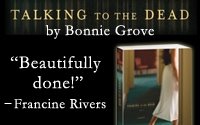I asked some writer friends of mine to share their process of taking an idea and turning it into a novel. Everyone is different, and has a different process, but one thing all novelists have in common is lots of ideas running around our brains. How do we weed out the merely interesting in order to nurture the truly compelling?
Rick Acker is here today to share a bit of his process. He's the author of Blood Brothers and Dead Man's Rule. Rick has been on the blog before, and he and I had a chance to yak and break bread at Mount Hermon this past April. It was great to get to know him a bit better - for a guy who works for the justice department, he wasn't the least big scary! You can find out lots more about him and his books at his web site.

Rick Acker writes while commuting to
and from his "real job" as a Deputy Attorney General in the California Department of Justice. He is the author of four published suspense novels and has a fifth under contract. Only one of his story ideas has failed to sell after reaching the proposal stage, though lots have died before then.
Story summary. I try writing up a short informal synopsis of the plot. This is short--roughly 300-500 words. If I can't turn it into something that "sings," I know it's probably a dud and I drop it.
Partner review. Next I find out whether my idea sings to my wife and writing partner, Anette. Anette has a very good eye for stories that work--and those that don't. She's also perfectly willing to "speak the truth in love" when an idea doesn't
quite make the cut, which is absolutely invaluable. But if she likes the story, I know

I've got something worth taking to the next step.
Agent review. If Anette likes my idea, I turn the synopsis into something longer (ca. 1-2 thousand words) and more formal. I also do a little market research to make sure the story I'm proposing hasn't already been written. Then I send it to my agent. He'll let me know whether he thinks I've got a "big book" idea--one that's not just publishable, but has a "wow" element that will make it stand out from the rest of the market.
Proposal. The final layer (short of actually writing the book) is creating the proposal. If the story still looks like a "big book" after two or three sample chapters and a marketing analysis, my agent starts pitching it to publishing houses.
BTW, fewer than 1 in 10 ideas make it all the way through this process and wind up as proposals. But well over half of the proposals sell.
Agent review. If Anette likes my idea, I turn the synopsis into something longer (ca. 1-2 thousand words) and more formal. I also do a little market research to make sure the story I'm proposing hasn't already been written. Then I send it to my agent. He'll let me know whether he thinks I've got a "big book" idea--one that's not just publishable, but has a "wow" element that will make it stand out from the rest of the market.
Proposal. The final layer (short of actually writing the book) is creating the proposal. If the story still looks like a "big book" after two or three sample chapters and a marketing analysis, my agent starts pitching it to publishing houses.
BTW, fewer than 1 in 10 ideas make it all the way through this process and wind up as proposals. But well over half of the proposals sell.
****
Fewer than one in ten? Gak! That gives us an idea of how many ideas are swimming around that brain of yours, Rick. And this post gives all of us a window on the need for outside perspective for our ideas. Writers can lose perspective easily - we can get lost in the possibilities and swim in our ideas believing they are vast as the ocean when in fact, we are splashing in the kiddie pool. Having a team of bright minds around us help us see the larger landscape by asking questions and forcing us to focus on the aspects of the idea that simply won't work - or are too shallow or short to carry a novel.
Thanks Rick!
I bid you good writing.









4 comments:
My pleasure, Bonnie. Thanks for having me on your blog!
This is one of those ideas that seems so simple and obvious that we are tempted to say, "Of course. That's what I've always thought." Except we haven't, of course. Thanks for this, Rick.
Rick's process is really for deciding whether to write a particular story, not how he actually writes it. Still, I found it interesting and likely helpful in the future.
Rick: Thank YOU for your insights!
Janet: Yep, I agree. It sounds so common sense - but the problem with common sense is, it isn't.
Patricia: Yes, this series is about how to take an idea and decide if it is "novel worthy". Thanks for stopping by!
Post a Comment